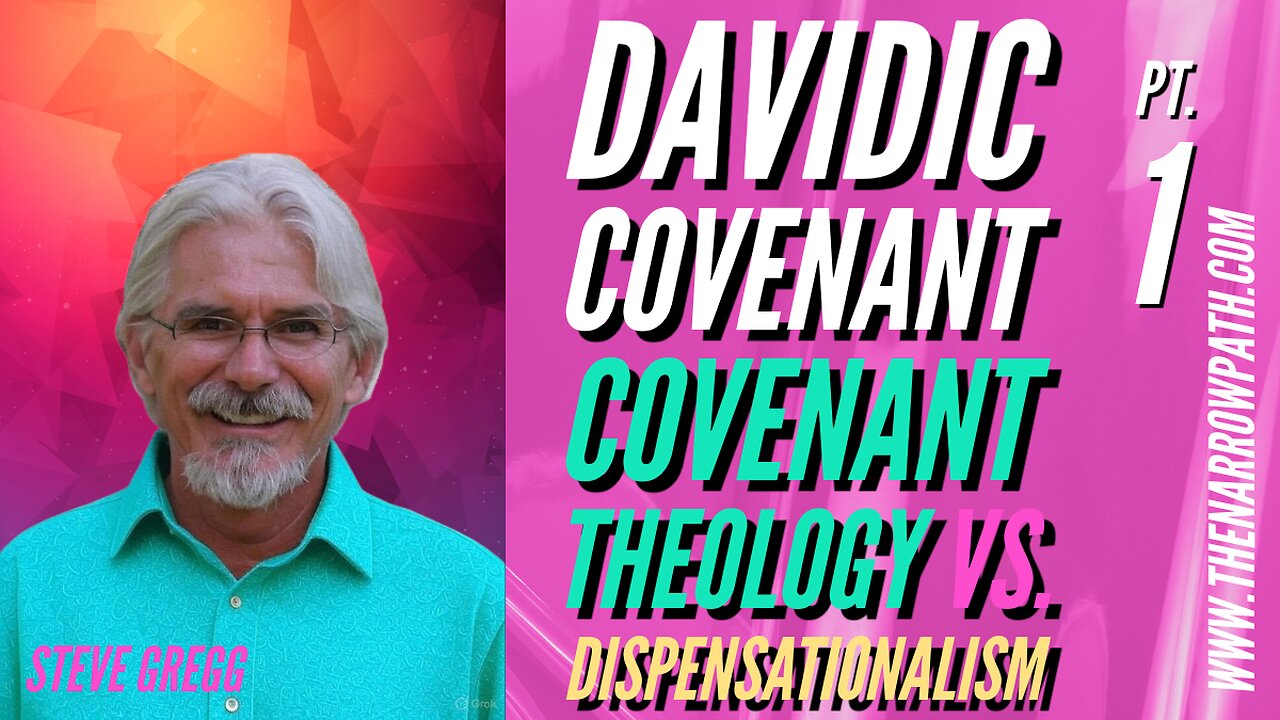Premium Only Content

Davidic Covenant Pt 1, Covenant Theology vs Dispensationalism - Steve Gregg
https://thenarrowpath.com | In Steve Gregg's lecture on the Davidic Covenant, part of his series "What Are We to Make of Israel," he contrasts the dispensationalist view—popularized in the 19th century by John Nelson Darby, which emphasizes the nation of Israel's key role in end-times prophecy—with the historic church teaching that identifies the true Israel as a spiritual entity comprising both believing Jews and Gentiles in Christ, often labeled "replacement theology" by dispensationalists. Gregg explores the Davidic Covenant from 2 Samuel 7, where God promises David an eternal dynasty, fulfilled initially through Solomon’s building of the temple and later kings, but ultimately through Jesus as the Messiah, who establishes a spiritual house (the church) and reigns eternally. He argues that while Solomon and other Davidic kings were types of Christ, Jesus, as the son of David and son of God, fulfills the covenant’s eternal promise through his resurrection and reign, challenging the dispensationalist focus on a literal national Israel. Additionally, Gregg focuses on the Covenant Theology view, emphasizing a unified covenantal framework where the Abrahamic, Sinaitic, and Davidic Covenants converge in Christ, portraying the church as the continuation and fulfillment of God’s covenantal promises to Israel.
FULL SERIES - YOUTUBE: https://www.youtube.com/watch?v=Scz5t_D-ung&list=PLtzt3JhaK2U6eSPTq0d07GqFpJDclldyT OR MP3: https://thenarrowpath.com/topical_lectures.php?v01#What_are_We_to_Make_of_Israel
Lecture Outline
Dispensationalism Overview
– Dominant perspective when discussing Israel, particularly in end-time
prophecy.
– Originated with John Nelson Darby in the 1830s; not taught by the
church prior to the 19th century.
– Some dispensationalists claim traces of their views in earlier writings,
but the system as a whole began with Darby.
– Emphasizes ethnic and national Israel as a key player in end-time prophecy.
• Historical Church Perspective
– For 18 centuries, the church taught that God called a believing remnant
of Israel through Christ.
– This remnant, consisting of Jews and Gentiles who believe in the Messiah, constitutes the ”true Israel” or the church.
– Dispensationalists label this view ”replacement theology,” claiming it
replaces Israel with the church, which they consider heretical.
– Historical view: Jews and Gentiles who believe in Christ are the Israel
of God (Galatians 6:16).
– Paul’s teaching: Those with the faith of Abraham, regardless of ethnicity, are Abraham’s seed (Galatians 3).
• Distinction Between Ethnic and National Israel
– Ethnic Israel: Descendants of Abraham, Isaac, and Jacob, regardless of
location.
– National Israel: The political entity established in 1948, including nonJewish citizens (e.g., Arabs in the Knesset).
– Dispensationalists often conflate ethnic and national Israel, assuming
both are central to biblical prophecy.
• Covenant Theology
– Covenants define God’s relationship with His people, similar to a marriage covenant.
– Abrahamic Covenant: Promises to Abraham’s seed, fulfilled in Christ
(Galatians 3).
– Sinaitic Covenant: Conditional covenant at Mount Sinai, requiring faithfulness; Israel’s unfaithfulness led to consequences.
– Davidic Covenant: Focus of the lecture, detailed below.
• The Davidic Covenant (2 Samuel 7:12–16)
– God’s promise to David:
* After David’s death, God would raise up his seed to establish a kingdom.
* This seed would build a house for God’s name.
* The throne of this kingdom would be established forever.
* God would have a father-son relationship with David’s seed.
* Discipline would occur for iniquity, but God’s mercy would remain
with David’s house.
– Appears unconditional, unlike the Sinaitic Covenant.
– Initially applied to Solomon (built the temple), but ultimately fulfilled
in Christ (Hebrews 1).
– Solomon and David as types of Christ; Christ as the antitype, building
a spiritual house (the church, 1 Peter 2:5, Ephesians 2).
• Jewish Expectations of the Messiah
– Jews expected a political Messiah to liberate them from Roman oppression, like David freed Israel from the Philistines.
– Recognized the Davidic Covenant as messianic, expecting a son of David
to reign forever (Matthew 12).
– Jesus acknowledged as the son of David (messianic title) but also the
Son of God (Romans 1:3–4).
#bible #newtestament #newcovenant #covenanttheology #newcovenanttheology #davidiccovenant #dispensationalism #gospel #jesus #david #bibleanswers #thenarrowpath #stevegregg
-
 18:11
18:11
The Narrow Path
4 months agoAbomination of Desolation: Caller Disagrees with Steve Gregg
1401 -
 9:26
9:26
MattMorseTV
1 day ago $20.90 earnedPam Bondi is in HOT WATER.
18.6K150 -
 13:46
13:46
Nikko Ortiz
14 hours agoYour Humor Might Be Broken...
17.5K2 -
 2:20:13
2:20:13
Side Scrollers Podcast
18 hours agoVoice Actor VIRTUE SIGNAL at Award Show + Craig’s HORRIBLE Take + More | Side Scrollers
49.4K13 -
 18:49
18:49
GritsGG
14 hours agoI Was Given a Warzone Sniper Challenge! Here is What Happened!
10K -
 19:02
19:02
The Pascal Show
1 day ago $1.74 earnedNOT SURPRISED! Pam Bondi Is Lying To Us Again About Releasing The Epstein Files
9.9K8 -
 6:05
6:05
Blabbering Collector
18 hours agoRowling On Set, Bill Nighy To Join Cast, HBO Head Comments On Season 2 Of Harry Potter HBO!
12.4K3 -
 57:44
57:44
TruthStream with Joe and Scott
2 days agoShe's of Love podcast & Joe:A co-Hosted interview, Mother and Daughter (300,000+Facebook page) Travel, Home School, Staying Grounded, Recreating oneself, SolarPunk #514
27.9K1 -
 30:49
30:49
MetatronHistory
1 day agoThe Truth about Women Warriors Based on Facts, Evidence and Sources
28.3K12 -
 2:59:08
2:59:08
FreshandFit
13 hours agoA Sugar Baby & A Feminist ALMOST Fight Each Other
259K57